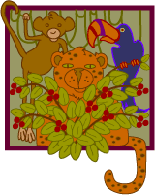Links
Links

www.350.org
350 means safety from the climate crisis. To preserve our planet, scientists tell us we must reduce the amount of CO2 in the atmosphere from its current level of 392 parts per million (“ppm”) to below 350 ppm. But 350 is more than a number—it’s a symbol of where we need to head as a planet. At 350.org, we’re building a global grassroots movement to solve the climate crisis and push for policies that will put the world on track to get to 350 ppm.
Conservation International
www.conservation.org
Conservation International (CI) believes that the Earth’s natural heritage must be maintained if future generations are to thrive spiritually, culturally and economically. CI’s mission is to conserve the Earth’s living natural heritage, our global biodiversity and to demonstrate that human societies are able to live harmoniously with Nature.
Natural Resources Defense Council
www.nrdc.org
Natural Resources Defense Council’s purpose is to safeguard the Earth: its people, its plants and animals, and the natural systems on which all life depends. NRDC works to restore the integrity of the elements that sustain life–air, land and water–and to defend endangered natural places. NRDC strives to help create a new way of life for humankind, one that can be sustained indefinitely without fouling or depleting the resources that support all life on Earth.
Fiber Futures
www.fiberfutures.org
Fiber Futures applies environmental advocacy and entrepreneurial know-how to foster the use of agricultural residues and dedicated forest-free fibers in the pulp & paper, building materials and textile
industries.
(415) 561-6546.
Conservatree
www.conservatree.com
Conservatree develops information, tools, and technical assistance to educate paper buyers about environmentally sustainable paper options. The nonprofit Conservatree developed from the environmental paper company that first introduced most types of recycled printing and writing papers. Its web site includes a Guide to Environmentally Sound Papers, along with sources, articles, and news.
(415) 721-4230.
ReThink Paper
www.rethinkpaper.org
ReThink Paper, a project of Earth Island Institute, seeks to catalyze a transition to an ecologically sound pulp and paper industry that protects forests, prevents air and water pollution, and conserves energy. RTP advocates using paper efficiently and replacing virgin wood with environmentally benign non-wood fibers, such as hemp, kenaf, and agricultural wastes.
(415) 788-3666 x 232.
World Wildlife Fund
www.worldwildlife.org
World Wildlife Fund’s Forests for Life campaign seeks to halt and reverse forest loss and degradation. WWF advocates doubling America’s forest protected areas and halting the construction of new logging roads in national forests. Where timbering occurs, WWF urges that it meet the highest standards of the Forest Stewardship Council.
(202) 293-4800.
The Consumer’s Choice Council
www.consumerscouncil.org
The Consumer’s Choice Council, an association of 60 nonprofit and governmental organizations from 25 countries, promotes and protects procurement and independent, third-party product labeling that benefits the environment, labor and human rights. The Council encourages the consumer’s right to know about the environmental and social impacts of products in the global market.
(202) 785-1950.
Oxfam: What’s That in Your Coffee?
www.oxfamamerica.org
The worldwide Oxfam campaign, Make Trade Fair, is drawing international attention to the rules of trade that cause great inequities between wealthy and poor nations. On September 18, 2002, Oxfam launched a worldwide campaign, called “What’s That in Your Coffee?,” to call attention to the plight of coffee farmers. 25 million coffee farmers around the world are plummeting into desperate poverty due to an oversupply of coffee that has driven down prices paid to growers. Oxfam calls for the major players in the coffee industry to support a Global Coffee Rescue Program to overcome the current crisis and create a more stable market.
(617) 482-1211.
Pesticide Action Network
www.panna.org
The Pesticide Action Network is a scientifically reliable source of information on what compounds your food and environment contains, how dangerous they are and how to organize to limit or eliminate pesticide use in your area. (
415) 981-1771.
Rainforest Action Network
www.ran.org
RAN is well known for working to protect the earth’s forests and supports the rights of their inhabitants through education, grass-roots organizing and non-violent direct action.
(415) 398-4404.
